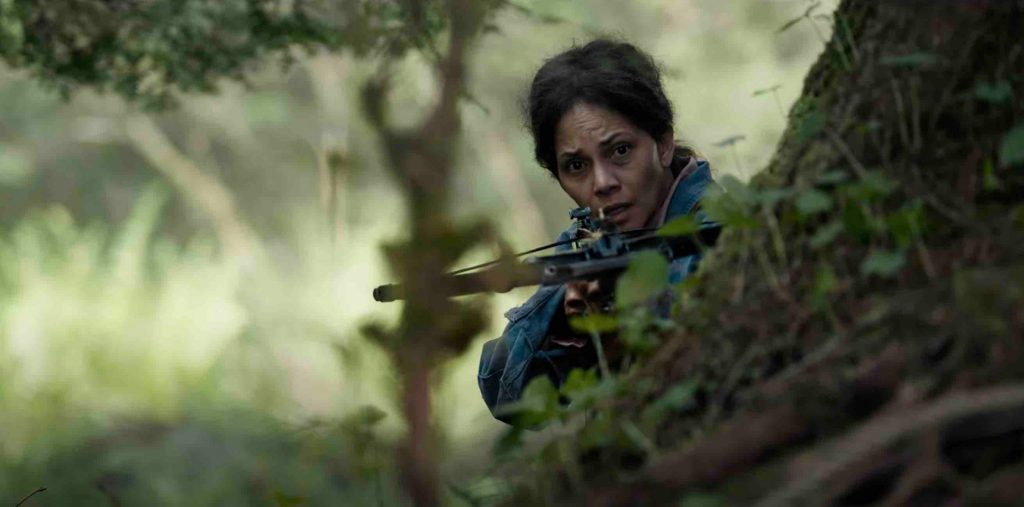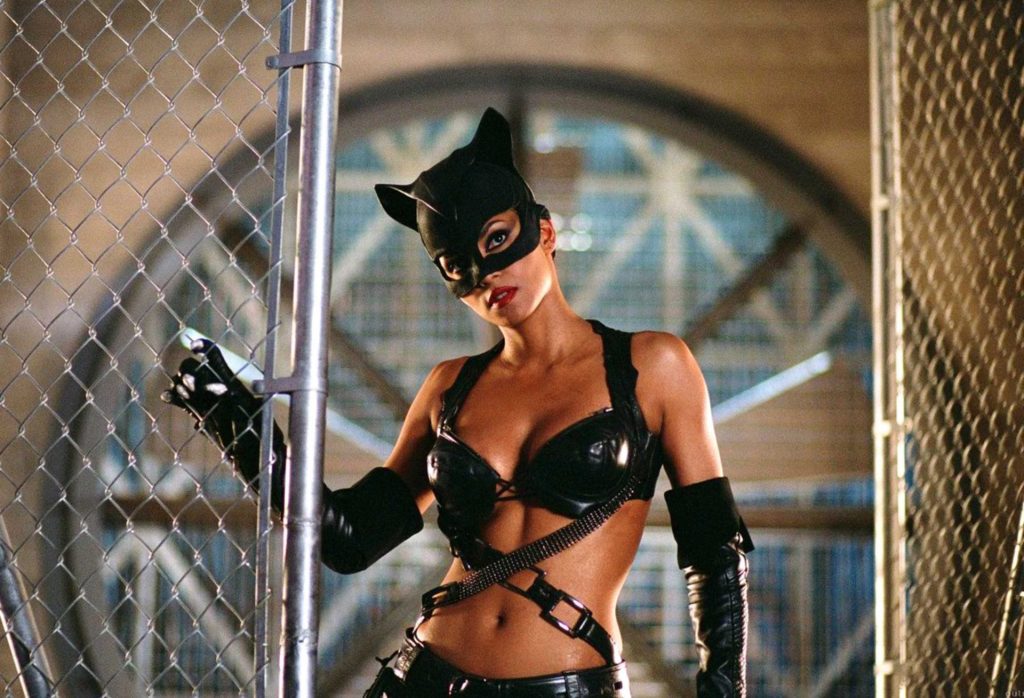THREE DECADES HAVE PASSED SINCE THE FORMER PAGEANT QUEEN WHIPPED HOLLYWOOD INTO A FRENZY IN HER BREAKOUT ROLE IN SPIKE LEE’S JUNGLE FEVER, YET THE TIMELESS OSCAR WINNER IS AS BUSY AS EVER, KICKING OFF FALL WITH AN APOCALYPTIC THRILLER, NEVER LET GO
BY WILL HARRIS

Halle Berry in Los Angeles, Aug. 25, 2021. In many ways, her new film “Bruised” lets her assert control over how she appears onscreen. But first she had to win the job. (Adrienne Raquel/The New York Times)
It’s been observed all too often in Hollywood that when actors get older, they continue to get leading roles, but when actresses get older, they suddenly start getting stuck in supporting roles. Thankfully, no one seems to have informed Halle Berry of this supposed rule of thumb.
Not only did Berry continue to headline films throughout her forties, but here she is only a few years away from hitting the big 6-0 (she turned 58 only a few weeks before this issue went to press), and in addition to having just co-starred with Mark Wahlberg in the action comedy The Union, which landed on Netflix in August, she’s also starring in a new horror film, Never Let Go, which hits theaters on September 20.
”Let me tell you, I am aging,” Berry said during a 2023 Instagram Live feed. “But I’m going down fighting.”
Although she started her career as a model, Berry began her rise to fame as a beauty pageant contestant, coming in as first runner-up in the Miss USA pageant and placing sixth in the 1986 Miss World competition. She kicked off her acting career in 1989 in a relatively rare manner for a new actress: serving as a main cast member of the ABC sitcom Living Dolls, a spin-off of Who’s the Boss?, in which she worked alongside former Waltons mom Michael Learned and future King of Queens star Leah Remini. While the series ultimately proved to be short-lived, lasting all of 12 episodes, it put her in the public eye, and it’s arguably what led to her securing an opportunity to audition for Spike Lee’s 1991 film Jungle Fever.
In fact, in a 2021 EW interview, Lee recalled that Berry came in numerous times (a result of his hesitancy about casting her to play a character he described as “a two-dollar crack ho”), but when she came in dressed for the part, that sealed the deal and secured her the role.

Halle Berry in Los Angeles, Aug. 25, 2021. In many ways, her new film “Bruised” lets her assert control over how she appears onscreen. But first she had to win the job. (Adrienne Raquel/The New York Times)
“I knew that I had to do that, because I knew I was fighting that model-turned-actor stigma, and that I would be perceived just on my physicality,” Berry told EW. “So when they say, ‘What was your breakthrough?’ I say, ‘It was Spike, because he was the first person that really allowed me to be seen other than for my physical self.”

Finally seen as a proper actress, Berry spent the 1990s displaying the depth and variety of her acting ability, moving successfully from comedies (Boomerang) to family films (The Flintstones) to dramas (Losing Isaiah) to action (Executive Decision), while also occasionally detouring to television for such high-profile projects as Alex Haley’s Queen and Introducing Dorothy Dandridge.

As the new millennium began, Berry could’ve easily decided to devote the 2000s to an action career, given how she kicked things off by playing Storm in the first X-Men f ilm and followed it by co-starring with John Travolta in Swordfish, but her path – and her place in history – changed forever in 2001 when she co-starred alongside Billy Bob Thornton in Monster’s Ball, which led her to become the first African-American woman ever to win an Oscar for Best Actress.
In 2022, Berry chatted with the New York Times about the night she made history, admitting, “I don’t have any memory of it. I don’t even know how I got up there. It was totally a blackout moment. All I remember is Russell Crowe saying, ‘Breathe, mate.’ And then I had a golden statue in my hand, and I just started talking.”

Berry had the frame of mind to dedicate the award to Dorothy Dandridge, who – in 1955 – was the first African American woman to be nominated for Best Actress, and to other previous African-American nominees, including Angela Bassett and Diahann Carroll. She also added, “This moment is so much bigger than me: it’s for every nameless, faceless woman of color that now has a chance because this door tonight has been opened.”
[Sadly, no further Black women have won Best Actress in the interim, and in the same New York Times interview, Berry conceded, “It didn’t open the door,” adding, “The fact that there’s no one standing next to me is heartbreaking.”]Immediately after Monster’s Ball, Berry added to her list of pop culture achievements by becoming a Bond girl, playing Giacinta “Jinx” Johnson in Die Another Day, a character who MGM was seriously considering spinning off into her own film but, alas, never actually did. From there, she quickly settled into a regular run of film and television work, and while a legendary bomb like 2004’s Catwoman might have killed another actress’ career stone dead, Berry promptly followed it with an Emmy-nominated performance in Their Eyes Were Watching God, and a few years later she pulled a Golden Globes nomination for her work in 2010’s Frankie and Alice, playing a stripper with dissociative identity disorder.

Halle Berry in TriStar Pictures thriller THE CALL.
In the intervening years, Berry has continued to work predominantly in film, although she did make a return to series television in 2014 with CBS’s Extant, a sci-fi series executive produced by Steven Spielberg.
“For me, I feel like the best writing now is on television,” Berry told Collider. “That’s been a real reality that all actors have been talking about, for years now. There was always a stigma with going to television. People used to say, ‘If you do movies, you can’t do television,’ but that line is becoming very grey. What’s important now, with the way the industry is evolving, is that we go where the good material is.”

Since then, however, Berry seems to have been finding the best material in films, since that’s where she’s worked since Extant wrapped its two-season run. In that time, however, she’s done ten films, including the two aforementioned 2024 flicks as well as a particularly high-profile turn in John Wick: Chapter 3 – Parabellum as Sofia.
“I never thought I’d be doing this as a career, and then at this age and stage still being able to work at the level that I work on,” Berry told E! News a few weeks ago. “But I came along at the right time when women are having longevity. There was a time when you were 40, you were kind of done. So it’s so nice to be a part of Hollywood now.”
